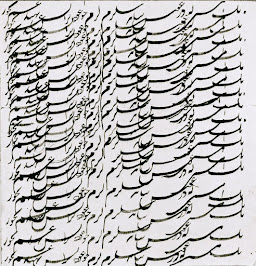Each evening at dinner Shoghi Effendi wore a light tan camel's hair overcoat, a white shirt, and a black tie. His complexion was a soft tan and his large brown eyes expressed his every emotion. From under his black fez, on each side, a few white hairs were mingled with the black. He was not a large man, but his presence filled the room. When the Guardian spoke of the accomplishments of the Bahá'ís the world over, he never included himself. He was a humble, gentle person and generally spoke in a soft voice; but when he explained the Administration, he spoke with a firm tone and great authority. When he was not speaking in a serious vein, he often made us laugh as he related some funny incident or experience that he or someone else had had, and then his eyes twinkled as he laughed. Nothing made Shoghi Effendi happier than news of the unity among the believers. During dinner he often spoke of what was occurring in many parts of the world. some evenings he would stay after dinner was over and tell us of good news he had received or explain some special Teaching.
- Ramona Brown (Notes from pilgrimage in 1954; ‘Memories of ‘Abdu’l-Baha: Recollections of the Early Days of the Baha’is of California’)

















